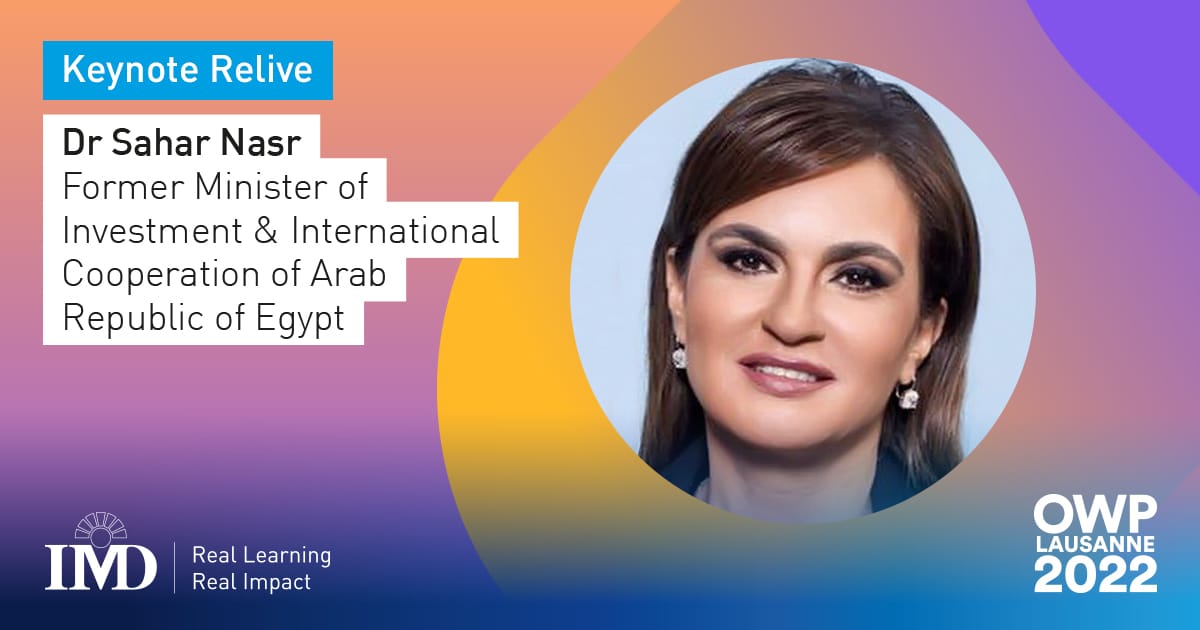
Serving as Egypt’s Minister of Investment and International Cooperation in the aftermath of its 2011 revolution, Dr Sahar Nasr faced a dual challenge: helping to put a challenging country on the path to prosperity while also blazing the tough trail as a woman in Egyptian politics.
During a wide-ranging keynote interview with IMD Professor of Leadership and Negotiation Sameh Abadir, Nasr said that she never felt discriminated against because, she said, she would never tolerate that kind of treatment.
“Why would you allow someone to do that to you in the first place?” she asked an audience of senior executives at IMD’s Orchestrating Winning Performance program. “I would never allow someone to discriminate against me; that’s not an option. I don’t like to talk about equality, just give me equal opportunities and I can deliver.”
After a formidable career including various senior roles at the World Bank, in academia as an economist, as an entrepreneur and in government, Nasr said her unflinching commitment to hard work and her fighting spirit meant she always moved forward “no matter what” – values she encouraged her university students to embrace.
“We just have to believe in ourselves,” she explained. “Not by ‘asking’ for equal rights; I don’t believe we should ask; we should say we can deliver.”
“We are top performers,” she continued. “When you look at schools, we often score higher, it’s the same when you look at SME projects. We should use numbers to prove we can do it. I don’t wait for someone to give me my rights.”
Leadership lessons from a post-revolution Egyptian policymaker
Under the spotlight in the years after the revolution in Egypt to help deliver a brighter future for her country, Nasr shared some powerful lessons for decision-makers operating in uncertain, highly-pressured environments where results are expected at short notice.
Set early priorities
Nasr said her approach was underpinned by setting priorities first – making tough calls to pick the right reforms and investments that would have the greatest impact. “Prioritization was one thing that was always in my mind,” she said.
Go for quick wins
“Coming out of a revolution,” she said, “there are lots of aspirations and ambitions, but it’s also a tough environment for people.”
As such, it was important to show stakeholders that you are delivering quickly in areas where results can be proven immediately to retain and build credibility and trust. “Pick your quick wins,” she said.
Be strategic
It is important to remember to weigh short-term demands against long-term needs. In government, some reforms take a long time to produce tangible results, so a strategic approach can ensure you strike the right balance.
Work as a team
It is easier to deliver by working together, rather than in silos. “We had to work as a team,” she said, describing how different actors in the government combined forces to create a joined-up approach across different sectors, from infrastructure to water.
Be honest
“You don’t impose credibility, you gain credibility by delivering. It’s not by talking, it’s not what you promise, it’s what you achieve – that is the only way to gain credibility,” she said.
By being candid and honest about progress, alongside being impactful, rather than painting a “colorful picture,” you will earn the trust of your stakeholders.
Currently a professor at Al-Yamamah University in Riyadh and the American University in Cairo, Nasr said she never felt any regret about decisions she had made or considered anything in her life or career a failure because she had always remained true to her ethics, values and beliefs.
“I feel it is a lesson learned,” she said. “All the different challenges I faced in life, I always see them in a very positive way. Every time I feel challenged, I become stronger and acquire knowledge about how to move on to the next phase.”




